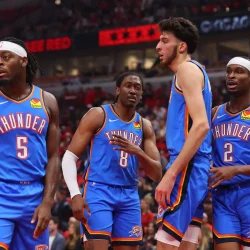 When news broke that Marcus Morris Sr. had been arrested in Florida on a Las Vegas warrant, fans did a double take. Documents obtained by Clark County prosecutors allege the NBA veteran walked away from MGM Grand with $115,000 in unpaid casino markers last December, then repeated the pattern for another $150,000 at Wynn Las Vegas the following month. In Nevada, these short‑term credit lines are treated like personal checks; once two written collection notices go unanswered, the debt can become a felony. This is allegedly what happened with Morris.
When news broke that Marcus Morris Sr. had been arrested in Florida on a Las Vegas warrant, fans did a double take. Documents obtained by Clark County prosecutors allege the NBA veteran walked away from MGM Grand with $115,000 in unpaid casino markers last December, then repeated the pattern for another $150,000 at Wynn Las Vegas the following month. In Nevada, these short‑term credit lines are treated like personal checks; once two written collection notices go unanswered, the debt can become a felony. This is allegedly what happened with Morris.
A Broward County booking photo rocketed across social media, sparking jokes about a player who has earned more than $100 million “stealing lunch money.” The chatter also rekindled debate over Vegas marker laws and the surprising number of high‑income athletes who hit financial potholes. Morris’s agent, Yony Noy, pushed back on what he called “absolute insanity,” insisting, “There is zero fraud here. In Nevada, any unpaid marker over $1,200 can trigger an arrest warrant.” Whether courts agree remains to be seen, but the episode is a reminder that casino credit is anything but free money—no matter how large an athlete’s paycheck.
Why Would an Multi-Millionaire NBA Player Steal This Money?
Sports stars love Vegas, so they are not immune to the frictionless spending encouraged by modern betting platforms ( كازينو مكافأة بدون إيداع) that lets high‑rollers draw five or six figure markers in minutes. The math makes sense: the more money one makes, the more money one will spend or risk.
As we know, NBA players aren’t always great with their money and big contracts do not always guarantee constant liquidity. Taxes, agent fees, real‑estate ventures, and lifestyle costs can strain cash flow between seasons. Sports Illustrated cites research showing 60 percent of retired NBA players face financial stress within five years of leaving the league. Although Morris is technically a free agent, his last NBA check arrived in April 2024. If casino payments coincided with free‑agency uncertainty, delays could snowball into overdue markers.
Even with all that, Noy insists his client did not pass fake checks. “This is due to an outstanding marker with a casino,” he wrote, framing the case as a debt dispute. Of course Markieff echoed chimed in to defend his NBA twin brother, “The wording is crazy. They got y’all really thinking bro did some fraud stuff… When y’all hear the real story on this, lesson learned.” The siblings point out that casinos routinely extend six‑figure credit lines to celebrities; missed payments can stem from paperwork delays, account transfers, or accounting errors rather than intent to deceive. Still, Nevada officials note that unpaid markers rarely reach felony court unless multiple repayment requests fail. In 2023 the state secured 695 convictions for similar offenses, according to Nevada Gaming Control Board data, underscoring how aggressively casinos protect markers.
How Much Did Marcus Morris Make in His NBA Career?
Across thirteen seasons with nine NBA franchises, Marcus Morris Sr. has earned more than $100 million in salary, according to Spotrac’s career‑earnings database. He later became a coveted stretch‑four in Boston’s 2018 conference‑final run, drilling 37 % of his threes and guarding LeBron James in crunch time. His value peaked in 2020 when he poured in a career‑best 19.6 points per game over 43 contests with the Knicks, a surge that helped New York flip him for a first‑round pick. The Clippers rewarded that production with a four‑year, $64 million contract, paying Morris $15.6 million last season before he finished the year with stints in Philadelphia and Cleveland. Through 850 career appearances Morris Sr. owns lifetime averages of 12.1 points and 4.5 rebounds, numbers that kept him in steady demand from contenders seeking floor spacing and toughness.
Legal Stakes and Possible Outcomes
Nevada classifies unpaid markers above $650 as category D felonies, punishable by one to four years in prison plus restitution and fines. Most cases settle long before trial; defendants repay the debt, cover legal fees, and see charges dismissed or reduced. “It is extremely rare for a first‑time marker offender to serve time once restitution is made,” veteran Las Vegas defense attorney Robert Langford told the Review‑Journal last year. Morris’s representatives say he plans to clear the balance quickly: “There will be no conviction,” Noy promised. If the money hits casino accounts before extradition, prosecutors often drop the warrant and allow the player to sign a civil repayment agreement.
Morris may soon explain the marker mess himself, but early signs suggest a debt dispute rather than a calculated heist. “They could have come to the crib for all that,” Markieff complained, highlighting how arrest optics can outshine the mundane reality of unpaid credit lines. From a legal standpoint, the case is likely to end with restitution, not prison bars. Yet the episode reminds athletes that casino markers carry tougher enforcement than standard credit cards. Fans who wonder why a nine‑figure earner would risk his reputation over $250,000 can look beyond tabloid headlines to see a cautionary tale about cash flow, state law, and the thin line between VIP perks and felony warrants.
















